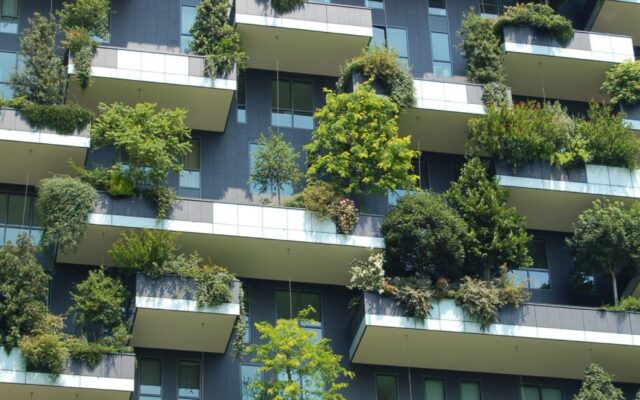
The Future of Eco Homes
With the rapid changes the world is undergoing, the spaces we call home might look unrecognisable in 20 years time. Technology is advancing, the population is booming and environmentalism is more prevalent than ever, so where might this lead us and eco homes? In this article, we’ll be answering that question and more.
Green energy
Our sources of energy are running out – that’s no secret – which is why we’re heading towards a solar-powered future. That is, our homes will be built with entire roofs created from photovoltaic panels. These collect sunlight and convert it into electricity, which can then power our homes.
The more efficient these panels become, the more of our homes they will be able to power. In time, they should be able to create enough solar energy to both power a home and run an electric car.
Biophilic design
Biophilic design has already become a popular trend, particularly in office environments. This is because research indicates that having plants around makes us feel better which, in turn, makes us more productive. Not only this though, plants help purify the air around us by absorbing pollutants. Given how little we like to open our windows, especially in winter, this is very beneficial to our health.
Minimal heat loss
The homes of tomorrow are going to have to be a great deal more energy efficient to help make renewable energy viable, so minimising heat loss will be a top priority. Many homes in the UK lose an incredible amount of heat through drafts, so future homes will have to be sealed with an airtight layer. Whether it’s made from steel, glass, plaster or concrete, this layer will have to be continuous if it’s to properly combat the elements.
Another factor which contributes towards a home’s heat efficiency is its size, which is why flats and terraced homes in cities are a lot more eco friendly than larger homes in rural areas. With this in mind, it’s easy to see why the homes of tomorrow are going to be getting smaller and smaller.
Open communities
One of the biggest issues with modern homes doesn’t directly relate to the buildings themselves, but rather what we do in them. Namely: the way we consume and dispose of food and other resources.
Bolstered by improved recycling methods, future communities will most likely be sharing resources between households, creating more and consuming less. On top of this, tasks like growing vegetables and cooking could be shared between homes and families too, helping to make communities more self-reliant.
In terms of what this might look like for our homes, you can expect that fences, hedges and other forms of partitioning to be much less common.
Here at Brown Recycling, we’re committed to a greener tomorrow.We offer a wide variety of waste disposal and recycling services to customers throughout Stoke-on-Trent, Crewe and the surrounding areas, and we make every effort to achieve a ‘zero-to-landfill’ target to help create a better future. To enquire about any of our services, give our friendly team a call today.
This website uses cookies to enhance your browsing experience and deliver personalised ads. By clicking “Accept All Cookies”, you agree to the storing of cookies on your device to enhance site navigation, analyse site usage, and assist in our marketing efforts.




